Nutrition for diarrhea and vomiting depends on the severity and cause of food poisoning. Symptoms like seizures, pains in the stomach and intestines, temperature surges deprive of appetite. But dehydration and rapid loss of vitamins and minerals require food intake. The most common recommendation is to eat light food, drink more liquid, do not use spicy, salty, sweet, fatty.
Drinking regime after diarrhea and vomiting
Food poisoning is the reason for removing a large amount of liquid. The onset of diarrhea and vomiting does not allow the food to be fully absorbed. It is ideal to take every hour a glass of mineral water such as "Essentuki 4" with an elevated salt content. You can drink "Regidron" from dehydration, water or other permitted liquids.
With diarrhea, mineral waters with a large amount of magnesium are excluded. With both ailments, it is necessary to release gases from the water, and it is better to purchase specialized drinks in the pharmacy.
Additionally, you can enter into the diet:
- rice broth, because the slimy drink contains a small amount of carbohydrates from rice and can make up the energy balance, and also soothe the gastrointestinal tract, since it has a soft texture;
- very weak decoction of St. John's wort, because the grass has a mild antispasmodic and antibacterial effect, allows you to recover faster;
- drink from the hips, which contains vitamin C, strengthens the immune system, helps to cope with food poisoning more quickly.
Strongly eliminated 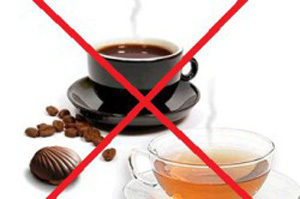 tea and coffee, carbonated drinks, homemade compotes of fruits and berries with a high sugar content.
tea and coffee, carbonated drinks, homemade compotes of fruits and berries with a high sugar content.
Important: it is not recommended to fill the water-salt balance with sports isotonic agents. They contain dyes and sweeteners, which can irritate the digestive system. The usual sugar also provokes the development of pathogenic flora and contributes to the deterioration of the condition.
The first day after the poisoning
During this period, vomiting and diarrhea are strong, you should take only drinks and rice broth, and all medications prescribed by your doctor are required. You can start eating on the second day, when the main symptoms become less pronounced.
If poisoning requires hospitalization, it is possible to administer nutritional droppers and other options for supplementary feeding. This question is solved individually by a doctor.
Permitted products for vomiting
What can you eat? Recommended 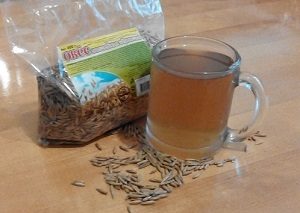 decoctions of rice and oats, as well as very viscous porridge of these cereals and buckwheat. It is necessary to boil the rump to a very mild state and grind the finished product with a blender or wipe it through a baby sieve. Such porridge will allow you to get the necessary carbohydrates and calm your stomach.
decoctions of rice and oats, as well as very viscous porridge of these cereals and buckwheat. It is necessary to boil the rump to a very mild state and grind the finished product with a blender or wipe it through a baby sieve. Such porridge will allow you to get the necessary carbohydrates and calm your stomach.
When the main symptoms of poisoning pass and vomiting stops, you can enter other groups of products:
- Wiped dishes of poultry and fish. Preferably white meat in the form of a souffle or cutlets without adding bread. The total amount of protein foods should not be high, enough 1-2 meals a day.
- Boiled eggs or steam omelettes. Not more than 1-2 eggs per day are allowed, fried dishes from them are not recommended.
- All fermented milk products. Preference is to give kefir, ryazhenka and cottage cheese a little fat.
- Potatoes and cereals, especially buckwheat, oats and rice.
- Non-mashed vegetables of soft consistency in a small amount - pumpkin, zucchini.
- From the allowed products, you can cook soups and turn them blender in puree.
- Porridge for convenience of use should be wiped through a sieve or crushed with a blender.
The rest of the products, including fruits, can be returned to the diet gradually, when the symptoms completely disappear. You can eat ordinary food after 4-5 days.
Vomiting may not be  a symptom of food poisoning. Her provocateur is often swings blood sugar, can vomit from a lot of sweet food. In this option, desserts and sweets are simply excluded for a long period.
a symptom of food poisoning. Her provocateur is often swings blood sugar, can vomit from a lot of sweet food. In this option, desserts and sweets are simply excluded for a long period.
Nutrition for diarrhea
Traditional medicine claims that a couple of days on black strong tea, crackers and hard-boiled eggs with white rice do wonders. Such a diarrhea diet is used quite often. To use national recipes or not, it is necessary to decide with the participation of a doctor. Officially boiled eggs should be limited exactly until the moment the symptoms subsided. Medical sources recommend eating eggs no more than 1-2 pieces per day.
After vomiting and diarrhea, what can you eat at all? Recommendations are similar to the rules of nutrition when vomiting: you need a soft, non-irritating food. Only here vegetables and fruits will have to be completely removed, as they contribute to strengthening peristalsis, which can cause significant discomfort.
Diet
Because of the difficult assimilation
food, diet should be divided. It is recommended to arrange not less than 5 receptions, the size of portions - no more than 300 ml. Water is drunk separately before or after a meal, as a strong stretching of the walls of the stomach can cause pain and discomfort.
Take food should be a little warmed up, but not hot. Cold dishes are also excluded, they can cause deterioration. All food is boiled, stewed or baked. Do not fry or cook in a grill with greasy sauces.
After the end of the acute period, you can return to normal diet. Recommend to gradually give up "extra" meals.
Other folk recipes
The diet is also advised to add folk remedies:
- 10 mg bark buckthorn brew in 200 ml of boiling water, to insist 20 minutes, take 2 times a day, divided into equal portions;
- brew 1 filter package of chamomile pharmacy (flowers) for 200 ml of hot water and take 100 ml 2 times a day;
- similarly do with 10 mg of marigold flowers, take, divided into 3 portions, before meals.
Prohibited foods for vomiting and diarrhea
While the symptoms did not stop, 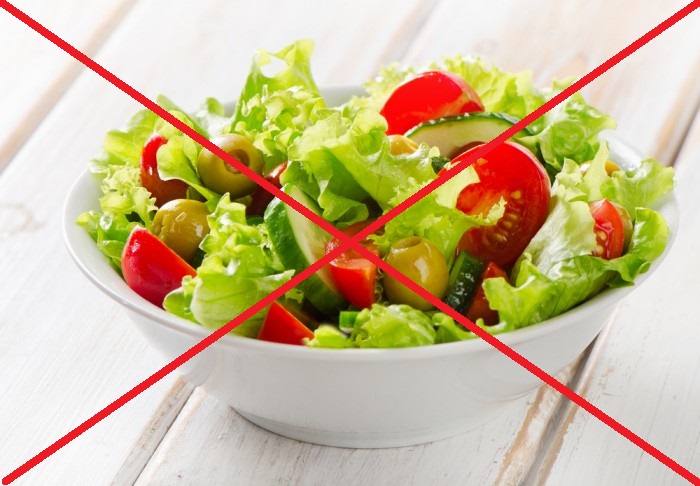 fruit, mashed potatoes and fresh vegetable salads are not recommended. This healthy food contains a lot of fiber and is digested long enough, so it can worsen your well-being.
fruit, mashed potatoes and fresh vegetable salads are not recommended. This healthy food contains a lot of fiber and is digested long enough, so it can worsen your well-being.
The rest of the list of exceptions is traditional for GI diseases:
- smoked meat, meat and fish semi-finished products, sweets, sausages, sausages;
- fried foods, fatty meat, butter, cheese;
- coffee, sweets, strong tea;
- semi-finished products, instant noodles and potatoes;
- beans, soybeans, beans;
- alcohol, carbonated water, other drinks with sugar, packaged juices.
A diet after diarrhea can become habitual. After the end of the acute period, you can return to your normal diet, but you need to do it carefully.
Why does vomiting and diarrhea occur? The most frequent and widespread case of occurrence of these ailments is poisoning by substandard products. To prevent harmful effects, you need to see a doctor and undergo a course of treatment.
And the strongest weapon against microorganisms that cause acute attacks of pain in the abdomen will be not only medication, but also a corresponding diet for diarrhea and vomiting. Even if you have a slight poisoning, it is necessary to "sit down" on a hungry diet and stick to it until vomiting and diarrhea will not pass.
What to eat?
With diarrhea and vomiting, the body loses a large amount of fluid and salt. To avoid disturbance of salt balance, it is necessary to drink salted boiled water. If vomiting stops, and nausea does not recede, drink a weak green tea with mint. Decoctions of herbs from chamomile will help to ease the cutting pain in the stomach.
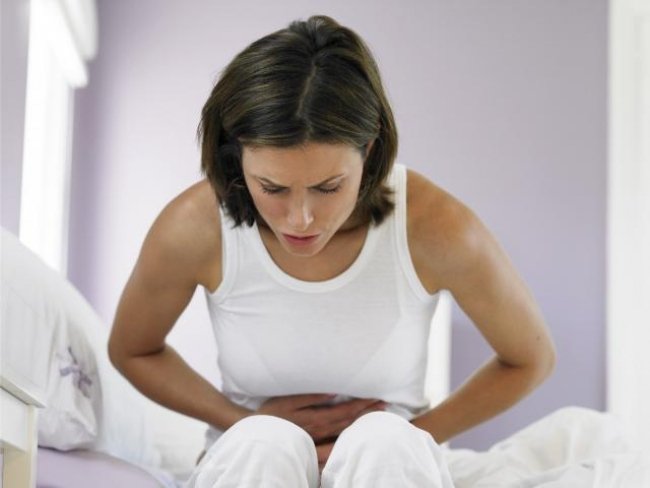
With a drink figured out, but that you can eat with diarrhea and vomiting? After all, it is known that you can not live long on a starvation ration. With food you will have to be very careful: one wrong step and bouts of pain, and with them both vomiting and diarrhea will return.
Therefore, you need to eat for at least a week porridge on the water and croutons (but not purchased with flavors and additives, and homemade). Prepare them will not be difficult. Take white bread, cut it into squares or small rectangles, place on a baking tray and in the oven for 5 or 7 minutes, depending on the thickness of the oven.
![]()
If the stomach does not revolt after cereals and rusks, then you can eat cutlets from lean meat cooked for a couple. Remember that fatty, smoked, salty foods, as well as products that are fermented (yogurt, kefir and other dairy delicacies) are now your sworn enemies. By the way, coffee, caffeinated cocktails and kissels are also not recommended.
Treatment of diarrhea in pregnant women with diet
Not only food poisoning, but also rapid hormonal restructuring can cause diarrhea. Most often suffer from a hormonal adjustment pregnant women. Please note that the information given below is for informational purposes only and should not be followed without the knowledge of the physician.
So, the diet for diarrhea in pregnant women should be based on the following principle: for two days you should eat oatmeal and rice porridge, cooked on water, apples, baked in the oven.
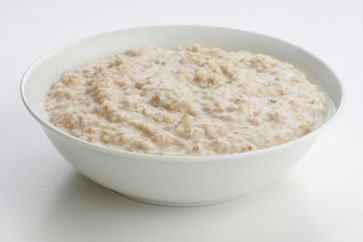
If diarrhea has become less frequent and less intense, then start eating white homemade croutons and drinking light tea. Then, the lean soup from fish or chicken and their boiled meat are gradually introduced into the diet.
Dysbacteriosis and diarrhea
The emergence of dysbiosis is associated with a violation of the intestinal microflora, manifested by swelling, gases, constipation or, conversely, diarrhea. At the initial stage of the diet, give up the products that cause bowel disorders. These are starchy, sweet and dairy products. This restriction is imposed because the "harmful" bacteria that live in the intestine are very fond of sugar and starch.
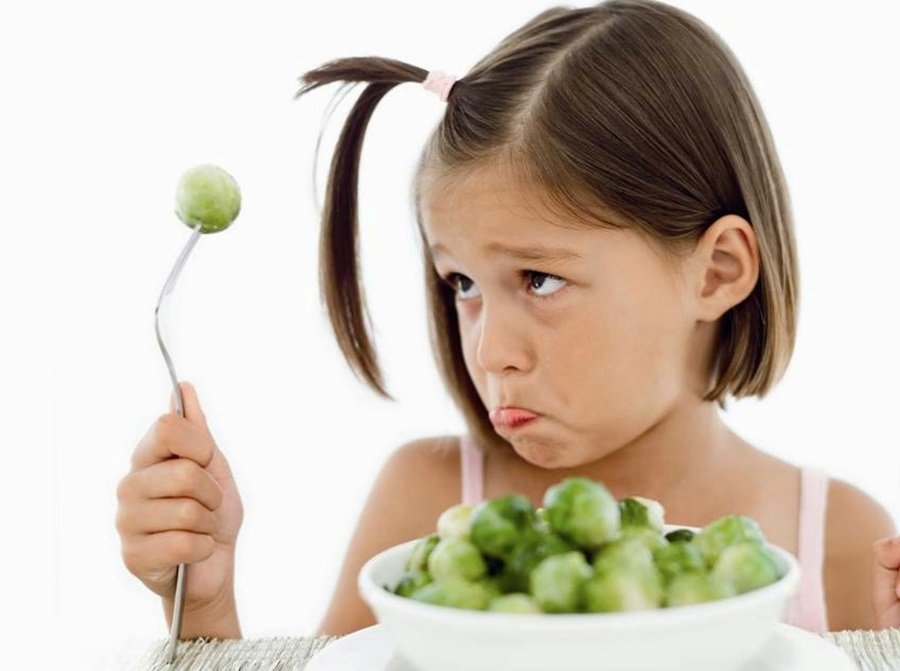
Marinated, fried, smoked dishes, sour fruits and berries have a negative effect on the work of the intestines, so discard them. Nutrition for dysbiosis with diarrhea should be built on the consumption of carbohydrates and fats of animal origin (any meat and fish, cooked so that they can be easily assimilated, for example, into a couple).
Of course, a diet for dysbacteriosis or diarrhea in pregnant women contributes to the cessation of diarrhea and normalization of the intestine. But if the seizures become more frequent, and the diet brings only temporary relief, then the trip to the doctor should not be postponed until tomorrow. Take care of your health!
Related videos of the article
With various deviations of the intestine, therapeutic nutrition is indicated. Including diarrhea. Diarrhea is a disorder of the stool, repeated repeatedly for a short period of time. The basis of treatment of this disease is diet № 4, which has its own characteristics and limitations.
Features of diet № 4
The therapeutic diet for diarrhea is designed to protect the intestinal wall from even more irritation. To do this, the diet for a time excludes food provoking the processes of putrefaction and fermentation in the body, contributing to the appearance or strengthening of the inflammatory process in the small intestine. Such a diet allows you to quickly restore the basic functions of the intestine, avoid dehydration of the body and get from the food during the treatment of all the necessary for its normal operation of trace elements. The term of its observance varies within 5-7 days, depending on the exact diagnosis and well-being of the patient.
Diet № 4 is considered very low-calorie. This is its main feature. All foods high in carbohydrates and fats are included in the list of banned. This diet also provides a fractional 6-meals a day. To avoid excessive stress on the digestive system, small portions should be eaten every 3-4 hours. Complete starvation in this case is excluded.
Permitted products for diarrhea
Diet № 4 allows to use the following products:
Macaroni from durum wheat;
Bakery products from flour of the highest grade, best in dried form;
Milk and dairy products of low fat content: cottage cheese, sour cream, kefir;
Chicken and quail eggs;
Low-fat varieties of fish, poultry;
Vegetable oil;
Butter, but not more than 5 g at a time;
Cereals: buckwheat, oatmeal, rice;
Fruits in the garbled form, mainly apples, pears;
Kissel;
Decoctions and fruit drinks from bird cherry, black currant, freshly squeezed juices (orange, peach, apple, carrot);
Strong green tea, coffee with skimmed cream, cocoa.
Preference should be given to food, steamed, without adding spices and seasonings. The daily diet for diarrhea is allowed to vary with vegetarian soups, fish soup from low-fat fish, steam omelette, porridges on the water.
Prohibited foods with diarrhea
Diet № 4 excludes the use of the following products:
Flour products;
Animal fats;
Vegetables in any form;
Fatty grades of fish and meat;
Canned food, sausages, smoked products;
Beans;
Dairy products with high fat content;
Pearl barley and barley cereals, millet;
Dried fruits;
Sweets, including sugar, honey, chocolate, ice cream;
Carbonated drinks, kvass;
Alcohol;
Sauces, spices, spices.
When diarrhea is not recommended to eat fried, too salty, fatty foods, you should also exclude from the diet pickles, marinades, caviar, canned foods. Dishes should be served on the table in a cold condition.

